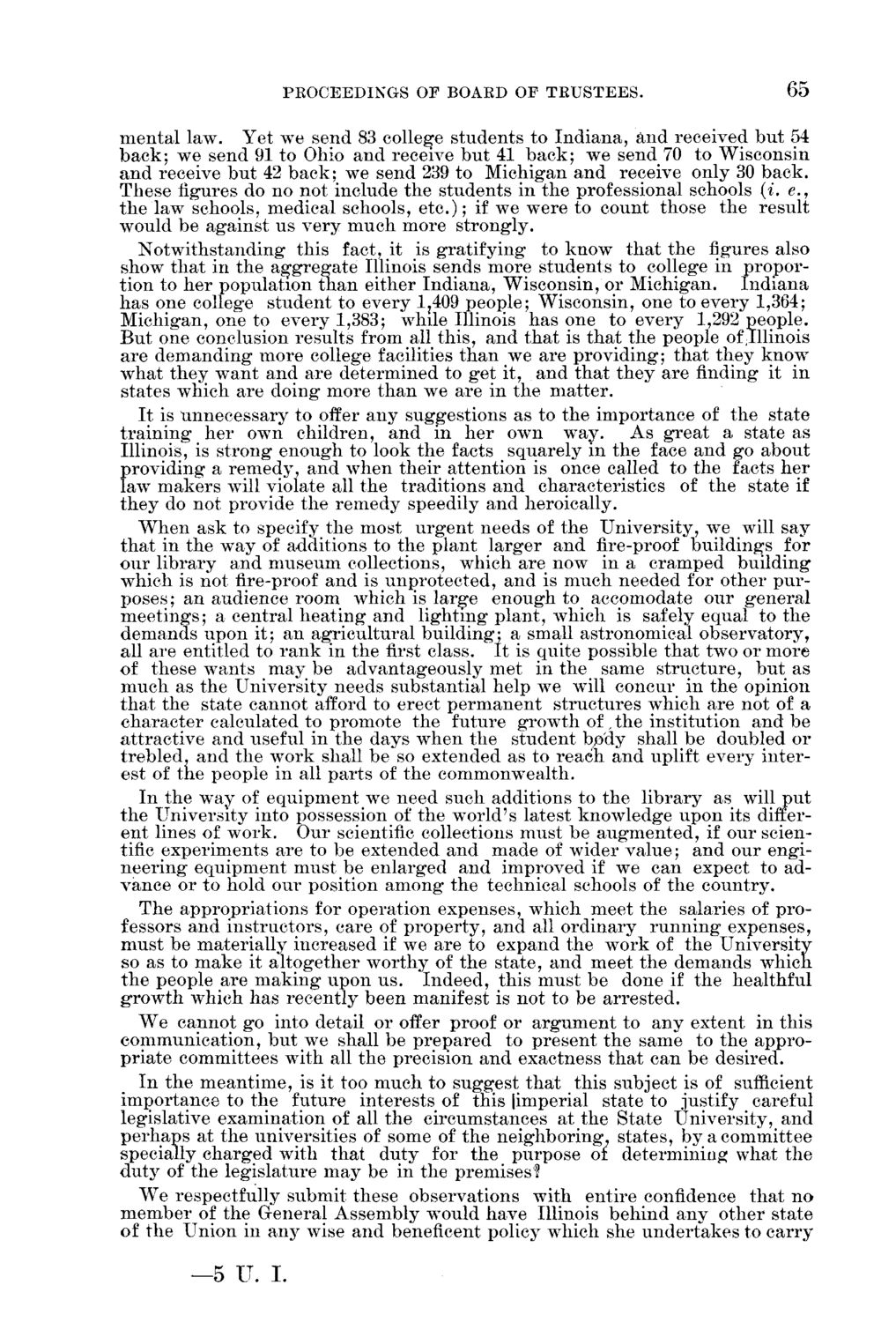| |
| |
Caption: Board of Trustees Minutes - 1896
This is a reduced-resolution page image for fast online browsing.

EXTRACTED TEXT FROM PAGE:
PROCEEDINGS OF BOAED OF TRUSTEES. 65 mental law. Yet we send 83 college students to Indiana, and received but 54 back; we send 91 to Ohio and receive but 41 back; we send 70 to Wisconsin and receive but 42 back; we send 239 to Michigan and receive only 30 back. These figures do no not include the students in the professional schools (i. e., the law schools, medical schools, etc.); if we were to count those the result would be against us very much more strongly. Notwithstanding this fact, it is gratifying to know that the figures also show that in the aggregate Illinois sends more students to college in proportion to her population than either Indiana, Wisconsin, or Michigan. Indiana has one college student to every 1?409 people; Wisconsin, one to every 1,364; Michigan, one to every 1,383; while Illinois has one to every 1,292 people. But one conclusion results from all this, and that is that the people of Jllinois are demanding more college facilities than we are providing; that they know what they want and are determined to get it, and that they are finding it in states wThich are doing more than we are in the matter. It is unnecessary to offer any suggestions as to the importance of the state training her own children, and in her own way. As great a state as Illinois, is strong enough to look the facts squarely in the face and go about providing a remedy, and when their attention is once called to the facts her law makers will violate all the traditions and characteristics of the state if they do not provide the remedy speedily and heroically. When ask to specify the most urgent needs of the University, w^e will say that in the w^ay of additions to the plant larger and fire-proof buildings for our library and museum collections, which are now in a cramped building which is not fire-proof and is unprotected, and is much needed for other purposes; an audience room which is large enough to accomodate our general meetings; a central heating and lighting plant, which is safely equal to the demands upon it; an agricultural building; a small astronomical observatory, all are entitled to rank in the first class. It is quite possible that two or more of these wants may be advantageously met in the same structure, but as much as the University needs substantial help we will concur in the opinion that the state cannot afford to erect permanent structures which are not of a character calculated to promote the future growth of, the institution and be attractive and useful in the days when the student bpdy shall be doubled or trebled, and the work shall be so extended as to reach and uplift every interest of the people in all parts of the commonwealth. In the way of equipment we need such additions to the library as will put the University into possession of the world's latest knowledge upon its different lines of work. Our scientific collections must be augmented, if our scientific experiments are to be extended and made of wider value; and our engineering equipment must be enlarged and improved if we can expect to advance or to hold our position among the technical schools of the country. The appropriations for operation expenses, which meet the salaries of professors and instructors, care of property, and all ordinary running expenses, must be materially increased if we are to expand the work of the University so as to make it altogether worthy of the state, and meet the demands which the people are making upon us. Indeed, this must be done if the healthful growth which has recently been manifest is not to be arrested. We cannot go into detail or offer proof or argument to any extent in this communication, but we shall be prepared to present the same to the appropriate committees with all the precision and exactness that can be desired. In the meantime, is it too much to suggest that this subject is of sufficient importance to the future interests of this |imperial state to justify careful legislative examination of all the circumstances at the State University, and perhaps at the universities of some of the neighboring, states, by a committee specially charged with that duty for the purpose of determining what the duty of the legislature may be in the premises! We respectfully submit these observations with entire confidence that no member of the General Assembly would have Illinois behind any other state of the Union in any wise and beneficent policy which she undertakes to carry —5 U. I.
| |